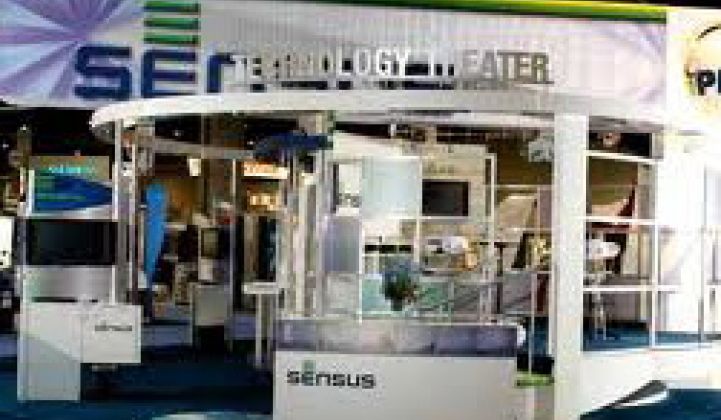Could smart meter giant Sensus be for sale? That’s what Reuters reported late Thursday night, citing two unnamed sources who said Sensus has hired Credit Suisse to find a strategic buyer or private equity firm willing to pay $800 million to $1 billion for the Raleigh, N.C. metering company.
If true, that would be big news in the small world of the global smart meter giants. A Sensus sale could start a smart grid bidding war, like the one that ended in rival smart meter giant Landis+Gyr’s $2.3 billion sale to Toshiba earlier this year. But then again, with a sizeable debt load and sliding sales, Sensus might not be as attractive an acquisition target as its rival.
Sensus is one of five companies -- the others are Itron, General Electric, Elster and Landis+Gyr -- that dominate today’s smart meter market. The firm held about 21 percent of U.S. smart meter market share as of last fall, in third place behind L+G and Itron. Reuters’ unnamed sources said that Sensus was seeking a valuation of 8 to 10 times its $100 million in earnings before interest, tax, depreciation and amortization (EBITDA), and was expecting interest from both strategic buyers and private equity firms. Both Sensus and Credit Suisse declined to comment on the report.
What might a potential buyer be getting? Although Sensus is privately held, the company has filed financial reports to the Securities and Exchange Commission because it had issued publicly traded debt. According to those reports, the company has seen net losses of $8.3 million in fiscal year 2008, $18.4 million in FY 2009 and $7.5 million in FY 2010, although its sales from continuing operations have risen steadily over that time, from $722 million in FY 2008 to $866 million in FY 2010.
In May of this year, Sensus landed a $675 million credit facility that allowed it to purchase $275 million in existing 2013 company notes, thus closing its SEC reporting obligations. But an April filing prior to that deal revealed that Sensus was carrying a total debt of $451 million and had $38 million cash on hand as of March 31. In other words, as the company said in its 2010 annual report, “We are highly leveraged and have significant debt service obligations,” and any potential buyer would presumably have to deal with that debt.
The company also projected that FY 2011 sales would likely come in below its 2010 record, though that's not unusual among smart meter vendors selling into the United States. Itron, for one, is laying off 750 employees and closing one-third of its factories as it projects slower U.S. sales this year, when the spike of meter installations spurred by billions of dollars in federal smart grid grants comes to an end.
On the other hand, Sensus reported a record sales backlog of $151 million as of March 31, up from $138 million at the end of 2010, and has big deployments with Southern Co. (which plans to install some 4.5 million smart meters over the coming years) and utilities including Exelon, PECO and Portland General Electric which could expand over time. All told, Sensus had about 9 million electric smart meters deployed as of this summer, and it also builds gas and water meters, with about 1 million "smart" water meters deployed.
What about its technology? Sensus differs from its four main smart meter competitors in that it uses licensed spectrum to connect its meters via point-to-point communications from towers. GE, Itron, Elster and L+G, on the other hand, have been relying mainly on connecting meters in mesh networks running in unlicensed 900-megahertz bands.
Sensus argues that licensing its spectrum gives it more reliability, as well as the critical ability to use high-powered signals to penetrate walls, manhole covers and other barriers -- characteristics that helped it land a deal to resell its system to rural electric coops in the U.S.
Unlicensed mesh networks, on the other hand, are cheaper and potentially more flexible and faster to deploy. Startups such as IPO candidate Silver Spring Networks and Trilliant have made deep inroads into the smart meter market through their mesh communications platforms.
One big question for Sensus might be how well it has managed the transition from proprietary networking technology to one based on open standards. The company has made much of its switch to internet protocol (IP) with its FlexNet smart meter system -- but all the other big smart meter vendors have been moving to IP-enabled networks as well. Sensus also bought into the distribution automation field with its 2010 acquisition of Telemetric, a Boise, Idaho-based utility communications and software provider, but it faces plenty of competition on that front as well.



